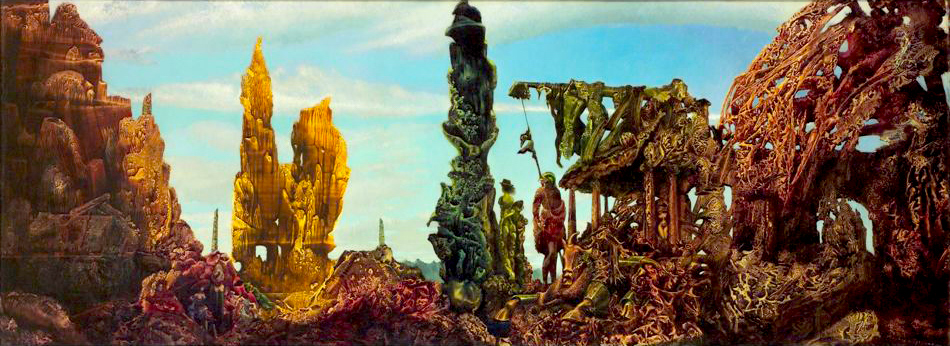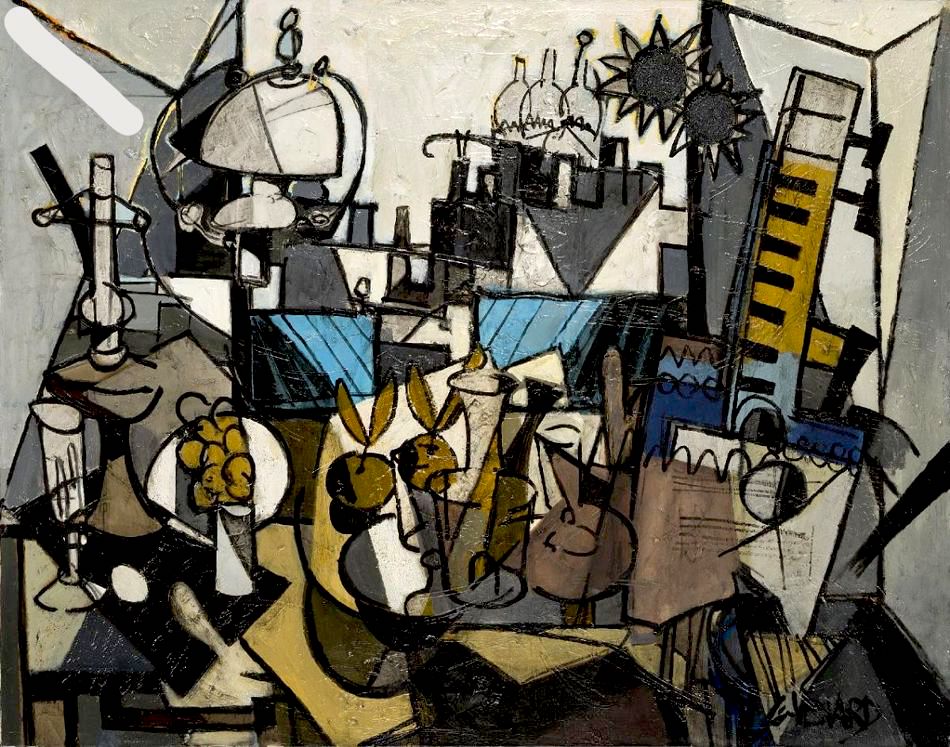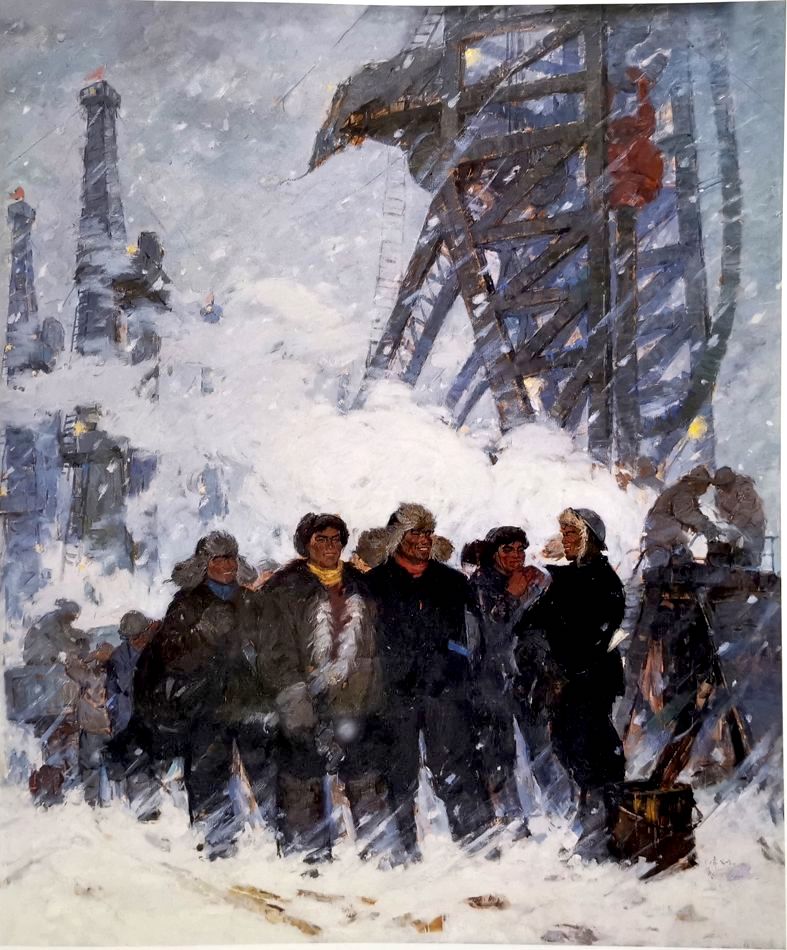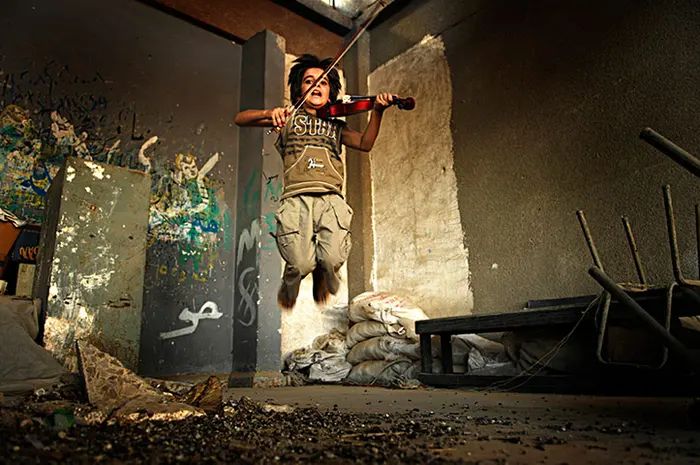Washington and its allies seek either to remain hegemonic and weaken China and Russia or to erect a new Iron Curtain around these two countries, writes Vijay Prashad. Both approaches could lead to a suicidal military conflict.

Max Ernst, Germany, “Europe After the Rain,” 1940–42.
By Vijay Prashad
Tricontinental: Institute for Social Research
 Over the course of the past 15 years, European countries have found themselves with both great opportunities to seize and complex choices to make.
Over the course of the past 15 years, European countries have found themselves with both great opportunities to seize and complex choices to make.
Unsustainable reliance on the United States for trade and investment, as well as the curious distraction of Brexit, led to the steady integration of European countries with Russian energy markets and more uptake of Chinese investment opportunities and its manufacturing prowess.
Closer linkages between Europe and these two large Asian countries, China and Russia, provoked the U.S. agenda to prevent that integration or delay it. This agenda, now deepened during the recent Group of 7 (G7) meeting in Germany and the North Atlantic Treaty Organization (NATO) summit in Spain, is creating a dangerous situation for the world.

Bram Demunter, Belgium, “Linking Revelations and Beekeeping,” 2019.
This goes back to the financial crisis of 2007–08, which was spurred on by the collapse of the U.S. housing market and several key U.S. financial institutions. The crisis signaled to the rest of the world that the U.S.-centered financial system was untrustworthy. The U.S. could not remain the market of last resort for the world’s commodities.
G7 countries – which saw themselves as the guardians of the global capitalist system – begged states outside their orbit, such as China and India, to put their surpluses into the Western financial system to prevent its total meltdown.
In return for this service, countries outside of the G7 were told that, henceforth, the G20 would be the executive body of the world system and the G7 would gradually disband. Yet, almost 20 years later, the G7 remains in place and has arrogated to itself the role of world leader, with NATO – the Trojan horse of the U.S. – now positioning itself as the world’s policeman.

Claude Venard, France, “Nature Morte au Sacre Coeur” or “Still Life at the Sacred Heart,” 1991.
NATO’s Secretary-General Jens Stoltenberg has said that the organization will undergo the largest overhaul of its “collective deterrence and defence since the Cold War.”
The NATO member states, now with the addition of Finland and Sweden, will expand their “high readiness forces” from 40,000 troops to 300,000 who, equipped with a range of lethal weaponry, will “be ready to deploy to specific territories on the alliance’s eastern flank,” namely the Russian border. The United Kingdom’s new chief of the general staff, General Sir Patrick Sanders, said that these armed forces should prepare to “fight and win” in a war against Russia.
With the conflict in Ukraine ongoing, it was obvious that NATO would foreground Russia at the Madrid Summit. But the materials produced by NATO made it clear that this was not merely about Ukraine or Russia but about preventing Eurasian integration.
China was mentioned for the first time in a NATO document at the 2019 London meeting, in which it was said that the country presented “both opportunities and challenges.”
By 2021, the tune had changed, and NATO’s Brussels summit communiqué accused China of “systemic challenges to the rules-based international order.” The revised 2022 Strategic Concept accelerates this threatening rhetoric, with accusations that China’s “systemic competition … challenge[s] our interests, security, and values and seek[s] to undermine the rules-based international order.”
Four non-NATO countries – Australia, Japan, New Zealand and South Korea (the Asia-Pacific Four) — attended the NATO summit for the first time, which drew them closer to the U.S. and NATO’s agenda to put pressure on China.
Australia and Japan, along with India and the U.S., are part of the Quadrilateral Security Dialogue (Quad), often called the Asian NATO, whose clear mandate is to constrain China’s partnerships in the Pacific Rim area. The Asia-Pacific Four held a meeting during the summit to discuss military cooperation against China, erasing any doubt about the intentions of NATO and its allies.

Ma Changli, China, “Daqing People,” 1964.
In the wake of the revelations of the 2007–08 financial crisis and the G7’s broken promises, the Chinese adopted two pathways to gain more independence from the U.S. consumer market.
First, they improved the domestic Chinese market by increasing social wages, integrating China’s western provinces into the economy and abolishing absolute poverty.
Second, they built trade, development and financial systems that were not centered around the U.S. The Chinese participated actively with Brazil, India, Russia and South Africa to set the BRICS process in motion (2009) and put considerable resources into the Belt and Road Initiative or BRI (2013). China and Russia settled a long-standing border dispute, enhanced their cross-border trade and developed a strategic collaboration (but, unlike the West, did not formulate a military treaty).
During this period, Russian energy sales to both China and Europe grew and several European countries joined the BRI, which increased mutual investments between Europe and China.
Earlier forms of globalization in Eurasia were limited by colonialism and the Cold War. This marked the first time in 200 years that integration began to take place on an equitable foundation across the region. Europe’s trade and investment choices were utterly rational, as piped natural gas through Nord Stream 2 was far cheaper and less dangerous than liquified natural gas from the Persian Gulf and the Gulf of Mexico.
Considering the chaotic Brexit situation and difficulties in getting the Transatlantic Trade and Investment Partnership off the ground, much of Europe saw Chinese investment opportunities as far more generous and dependable than other alternatives. In contrast, risk-averse and rent-seeking private equity from Wall Street became less attractive to the European financial sector.
Europe was drifting inexorably towards Asia, which threatened the basis of the U.S.-dominated economic and political system (also known as the “rules-based international order”).
In 2018, U.S. President Donald Trump publicly chastised NATO’s Stoltenberg, telling him,
“we’re protecting Germany. We’re protecting France. We’re protecting all of these countries. And then numerous of these countries go out and make a pipeline deal with Russia, where they’re paying billions of dollars into the coffers of Russia. … Germany is a captive of Russia… I think it’s very inappropriate.”
While NATO’s language has turned to threats of war against China and Russia, the G7 has pledged to challenge China-led initiatives by developing the new Partnership for Global Infrastructure and Investment (PGII), a $200 billion fund to invest in the Global South.
[Related: The US & China’s Belt & Road Initiative]
Meanwhile, the leaders at the BRICS summit, held at the same time, offered a sober appraisal of the times, calling for negotiations to end the Ukraine war and measures to stem the cascading crises experienced by the world’s poor. There was no talk of war from this body which represents 40 percent of the world’s population and BRICS’s strength may well grow as Argentina and Iran have applied to join the bloc.

Jamal Penjweny, Iraq, “Iraq Is Flying,” 2006–10.
The U.S. and its allies seek either to remain hegemonic and weaken China and Russia or to erect a new Iron Curtain around these two countries.
Both approaches could lead to a suicidal military conflict. The mood across the Global South is for a more measured acceptance of the reality of Eurasian integration and the emergence of a world order based on national and regional sovereignty and the dignity of all human beings, none of which can be realized through war and division.
Anticipations of a war at a scale not seen before evokes “A Personal Song” by the Iraqi poet Saadi Yousif (1934–2021), written just before the U.S. started its deadly bombardment of Iraq in 2003:
Is it Iraq?
Blessed is the one who said
I know the road which leads to it;
Blessed is the one whose lips uttered the four letters:
Iraq, Iraq, nothing but Iraq.
Distant missiles will applaud;
soldiers armed to the teeth will storm us;
minarets and houses will crumble;
palm trees will collapse under the bombing;
the shores will be crowded
with floating corpses.
We will seldom see Al-Tahrir Square
in books of elegies and photographs;
Restaurants and hotels will be our roadmaps
and our home in the paradise of shelter:
McDonald’s
KFC
Holiday Inn;
and we will be drowned
like your name, O Iraq,
Iraq, Iraq, nothing but Iraq.
Vijay Prashad is an Indian historian, editor and journalist. He is a writing fellow and chief correspondent at Globetrotter. He is an editor of LeftWord Books and the director of Tricontinental: Institute for Social Research. He is a senior non-resident fellow at Chongyang Institute for Financial Studies, Renmin University of China. He has written more than 20 books, including The Darker Nations and The Poorer Nations. His latest books are Struggle Makes Us Human: Learning from Movements for Socialism and, with Noam Chomsky, The Withdrawal: Iraq, Libya, Afghanistan, and the Fragility of US Power.
This article is from Tricontinental: Institute for Social Research.
The views expressed are solely those of the author and may or may not reflect those of Consortium News.

When the curtains came down on Nazi Germany, Hitler and the Nazi top brass wanted to destroy everything. For example, they gave the orders to destroy Paris before retreating. Among the German military there were those who said, let’s not do it, let’s think about Germany after the war and about how Germany will be treated by the victors. To Hitler that was irrelevant, to Hitler, the German people might as well disappear if they didn’t have the will to win.
I sometimes think that US Neocons with their American exceptionalism may take a similar stance. Perhaps they decide that a world in which America does not lead is not a world worth having. Perhaps they decide to take us all down with them in a nuclear Armageddon.
One of the reasons Washington harassed and baited Moscow into its liberating SMO in Ukraine was to try and de-link Russian commercial relations from Western Europe.
Vijay Prashad paints a tapestry with words that show the true nature of the beast that the world must confront at some point, and I think sooner rather than later. The beast is US and Western economic imperialism, which must have its way, or it will destroy all who stand in its way. The world may have become woken to this after the 2007 /8 US caused economic crisis, but the great mouth piece of the beast has announced its goals and intentions as early as the collapse of the Soviet Union in the early 1990s. First with the Wolfowitz Doctrine which stated that,
“Our first objective is to prevent the re-emergence of a new rival, either on the territory of the former Soviet Union or elsewhere, that poses a threat on the order of that posed formerly by the Soviet Union. This is a dominant consideration underlying the new regional defense strategy and requires that we endeavor to prevent any hostile power from dominating a region whose resources would, under consolidated control, be sufficient to generate global power.”
Zbigniew Brzezinski advocated a similar US political posture in his Grand Chess Board.
The world was warned.
WHAT a concept, an “of, by & for the people” world!!! Who’d a thunk?!? CHANGE THE FUNDAMENTALS: AND, 1) Markets Improved by Increasing wages, 2) Created ALL Inclusive Communities, 3) Abolished Absolute Poverty, 4) Fostered BRICS & BRI, 5) Established & adhered to a “Gentlemen’s Agreement,” China and Russia settled a long-standing border dispute, enhanced their cross-border trade and developed a strategic collaboration;” and, 6) Inve$tments & $ales, Flourished!!!
The benefits of the one belt one road initiative, i.e., “It facilitates to connect people through road ways, air ways and water ways, coordinating policies of various governments, financial integration through cross border business, productivity and regional energy security.”
“IMAGINE all the people, living life in peace. You may say I’m a dreamer; but, I’m not the only one. I hope someday you’ll join us. And the world will live as one. And, the world could live as one.”
“Our only, slim hope is that a bunch of Hollow Men obsessed by the Second Coming won’t turn Cold War 2.0 into Armageddon.” PEPE ESCOBAR
Related “Reports.” Best Practice: CRANK ‘EM UP!!!!
The CHRIS HEDGES Report: Vijay Prashad “Struggle Makes US Human” hxxps://m.youtube.com/watch?v=uHBo5qqpVtw
THE PRESS PROJECT: Lamprini Thoma (Athens, Greece) & Pepe Escobar (Paris, France) “From a unipolar to a multipolar world” hxxps://m.youtube.com/watch?v=rkIMNORkjR8
“All governments lie, but disaster lies in wait for countries whose officials smoke the same hashish they give out.” I.F. Stone
PEPE ESCOBAR: The Eagle The Bear and The Dragon, hxxps://consortiumnews.com/2019/05/06/pepe-escobar-the-eagle-the-bear-and-the-dragon/
I love Vijay Prashad.
I second this emotion!!!
I third Vijay too and could listen to him speak all day and not tire from it, as I listen to him on kpfa.org radio over the years.
One of my heroes for sure!
On the rabid misanthrope Jens Stoltenberg, he makes his fellow countryman Quisling, of the WW2 era seem like a Boy Scout Troop Commander.
“NATO member states, now with the addition of Finland and Sweden, will expand their “high readiness forces” from 40,000 troops to 300,000 . . . ”
Long on talk. Can their economies support this very expensive commitment?
Factually, The West is collapsing, irreversibly.
Discussed at some length here . . . hxxps://les7eb.substack.com/p/ukraine-notes-the-long-proxy-war-b15
The whole “West” is delusional, as can easily be seen by anyone not taken in by the media, which all echo the same lies and push them into every aspect of discussions of international interactions. Every thing reported about Ukraine is from the point of view of Uke sources, never questioned. Russia has NO rights and is evil? china is even more evil. Do none of these people have insight or even powers of observation? Russia will “win” this war, the West is in deep trouble, yet we see the continued pursuit of hegemony regardless of facts.
Vijay Prashad great clear presentation of historical fact aptly describing international banking’s 3D Chess Tournament on the devil’s chess board.
At stake hundreds of millions of lives and trillions and trillions of access coupons worth their weight in gold or some other bright shiny calf.
The white hoards of the west may have finally been worn down by their own arrogant, conspicuously, ignorant, lavish, expenditure of time, resources, to the pursuit wealth to support personal self indulgence.
Vera, with respect to “live and let live “, one must posses a talent, quality or certain aptitude for one to be compassionate. When the histories of the tribes are laid bare and examined they speak volumes. The most wealthy of tribes oft feel no such emotion, thought of kindness or need to do so.
Thanks CN
Capitalists (ie, the very rich) want no part of an equitable society. Such a society is a serious threat to them. They want no one questioning massive inheritance or the rich and their corporations not paying taxes. Unfortunately the oligarchs of Russia (and other nations) have the same views. They would all return us to feudalism. In that system you walk the footprints of your father. None question the rich or the ruler. Blood always trumps merit.
“Globalization” in the Western edition did not solve the problem of maintaining elevated level of living (compared with the rest of the world) when the advantages of the West are receding. Everything being equal, it is better to a business to produce goods or services where the labor is cheaper, but a number of advantages may make it more profitable to use more expensive labor: existing productive investments, infrastructure, education matching the needs and “rule of law” (what part of profit is lost to corruption, arbitrariness of authorities etc.).
One remedy, especially for UK and USA, was to focus on financial services while allowing de-industrialization. That follows the path of the Netherlands fro early 17th century, when the Netherlands were dominant in manufacturing (manu-, hand, still understood literally), finance and transportation, to early 18th century when the Netherlands remained a banking center, still rich but with much reduced power. Northern Italy went through the same process a century or so earlier. In other words, this is a gentle route to decline.
The second remedy seems return to the “roots”, after all, the British started their empire with piracy and pillage in 16th and 17-th century, before they overtook the Netherlands in the second half of 17th century as a center of making of goods and eventually, the home of industrial revolution. This edition of “rule based world order” is frantic, irrational and, above all, un-attractive for countries like India and everybody else relegated to lower tiers of RBWO. India is notable by having critical mass making it relatively easy to defy RBWO when it yields sufficient gains, like one-two billion dollars monthly saved by buying Russian oil.
In my opinion, it is too early to claim Eurasian Integration. I see a collection of state that conduct trade and other interactions to its best convenience without some “center” dictating terms. To the degree integration can be noticed it is in response to diktats that defy their interests (both hoi polloi end of the elite). Fabled Western financial system showed itself more risky than investing in Zimbabwe. But one can see harbingers of Western Disintegrations, the type of stupidity that terminated fate of some kingdoms, empires and tribal coalitions in the past: pick an enemy and attack relentlessly without heeding the internal cost, growing dangers from elsewhere etc.
It isn’t just the US…to my mind, it is the entire white culture imposing on other cultures and not exactly setting the best examples. Live and let live…
Well, as far as I’m aware, those same victims might include white people as well, e.g. continental Europeans having to learn English as a mandatory school subject whether they like it or not.